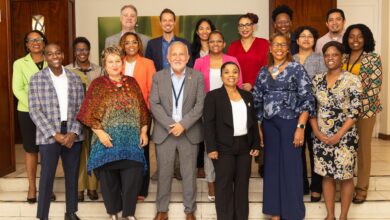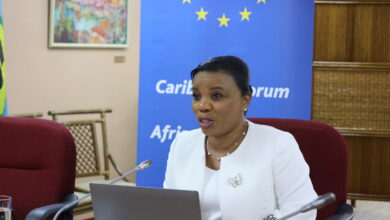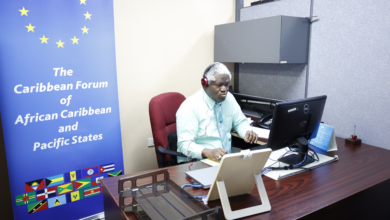Honourable Minister of Economic Development and Trade of Grenada and CARIFORUM High Representative,
Honourable Ministers,
Your Excellencies the Ambassadors and Other Representatives of CARIFORUM States,
Distinguished Members of National Delegations,
Distinguished Director General of CARIFORUM,
Ladies and Gentlemen,
It is my pleasure to be here in Georgetown, Guyana for the third meeting of the Joint CARIFORUM – EU EPA Council.
I am much honoured to represent the EU side in this meeting alongside Commissioner Cecilia Malmström.
I would like to thank Guyana for their hospitality in hosting the Third Meeting of the Joint CARIFORUM-EU Council.
The EU has a long-standing partnership with the Caribbean based on strong historic, economic and cultural ties. We share interests and values, and face common challenges.
Over the last years, our relationship has evolved. We keep our engagement for the development of the Caribbean under the 2000 Cotonou Agreement. But we added new elements. We aspire to create a modern partnership based on trade and political cooperation. Our 2008 CARIFORUM-EU Economic Partnership Agreement and 2012 Joint Caribbean-EU Partnership Strategy are a vivid expression of this.
Together we are strong – a strong voice in the United Nations, a strong voice in the world, a strong voice in this region. We can have a decisive impact on climate change negotiations in the run up of the 21st Conference of the Parties to the COP21 in Paris and the post-2015 development agenda. We can have a decisive impact on the fight against illegal trafficking of drugs, weapons, human beings.
The Caribbean countries play a special role within the bigger region, as the recent EU-CELAC summit has shown. Heads of State and Government from the Caribbean had a special meeting with President Tusk and High Representative Federica Mogherini there. The following months will be crucial to build on the commitments agreed there.
We need to step up efforts to implement the 2012 Joint Caribbean EU Partnership. These efforts concern our commitment to Haiti, to regional integration, to climate change, environment and disaster management, sustainable energy and to citizen security.
The signature of an important 346 Million Euros Regional Indicative Programme illustrates the EU's continued commitment to support Caribbean action on and will support political action in these areas.
The visa waiver agreements recently signed with five Caribbean States also demonstrates our willingness to bring our peoples closer together.

Political Dialogue is extremely important to unleash the potential of our cooperation and to move towards our common aims at global level. It should take place as soon as possible at Senior Political Level, as it was agreed in Brussels on the 11 June in the EU-CELAC Summit.
Political dialogue will also take place here, amongst us. Our main task today will be to agree on the way forward of our Economic Partnership Agreement, the first which the EU has entered into. Commissioner Malmström will lead in the debate on the 5-year review. Let us make the most out of this pioneer agreement by identifying a clear set of priorities.
Other issues on the common agenda will not be forgotten. Let me remind you of the EU engagement for universal Human rights. Universal, but also very concrete. The EU has been vocal in defending the Human rights of persons of Haitian descent which live in many parts of the Caribbean.
The issue was discussed by the Heads of State and Government at their meeting on the 11 June in Brussels. The Prime Minister of the Bahamas made a report on the situation of persons of Haitian descent in the Bahamas. Many concerns were raised specifically with regard to the situation in the Dominican Republic, and the Foreign Minister of this country made a statement on the situation in the Dominican Republic.
The outcome of the meeting was encouraging. The CARIFORUM members agreed to work out proposals for benchmarks and for a monitoring mechanism of the situation in the Dominican Republic. We were heartened by this frank but constructive approach to the problem. The EU is waiting for this CARIFORUM proposal and stands ready to consider active support.
The EU will continue to monitor the Human rights situation of persons of Haitian descent very closely herself. The efforts by the Government of the Dominican Republic to regularise the persons who were left stateless after the judgement of the High Court are appreciated.
However, this is not enough. It is indispensable that the Dominican Republic keeps her commitment to desist from mass deportations, while the regularisation process continues. Already 30,000 people of Haitian origin living in the Dominican Republic have returned to Haiti, since the 17 June. It is essential to make sure that returns are really voluntary. The EU will continue to follow this matter closely.
This political commitment is also accompanied by substantive support through our cooperation. We currently fund a range of projects focused on the issue, including six projects helping to protect the rights of migrants and Dominicans of Haitian descent , accompany migrants in the National Regularisation Plan, and support documentation processes to better guarantee the human rights of Haitian migrants and their descendants.
While the EU will continue with her commitment for Human Rights in the region, the initiative should now be taken by CARIFORUM. It would be a great example for the world if the region could come up with a coordinated proposal for benchmarks and monitoring of such a thorny Human Rights issue.
I expect we will discuss today the question of cooperation in taxation matters. While Commissioner Malmströem will speak on this on behalf of the Commission, let me state beforehand that the EU is very sensitive to the external effects of internal actions.
Tax matters are an important issue within the EU. And they are an important issue for fair play world-wide. No one can claim to be let off the hook in this matter. But it must also be managed with sensitivity and with respect.
The EU and its Member States have reacted quickly to the responses which have come to the latest initiative of the Commission – the interactive map showing the state of cooperation on tax matters.
They have discussed this as recently as last Friday. The EU wishes to make concrete proposals for a cooperative approach in this matter. Commissioner Malmström is best placed to present you with the details when we come to this matter in our agenda.
Let me hand over to her, looking forward to a good debate on the Economic Partnership, our main topic. The EU is committed to make it work.






